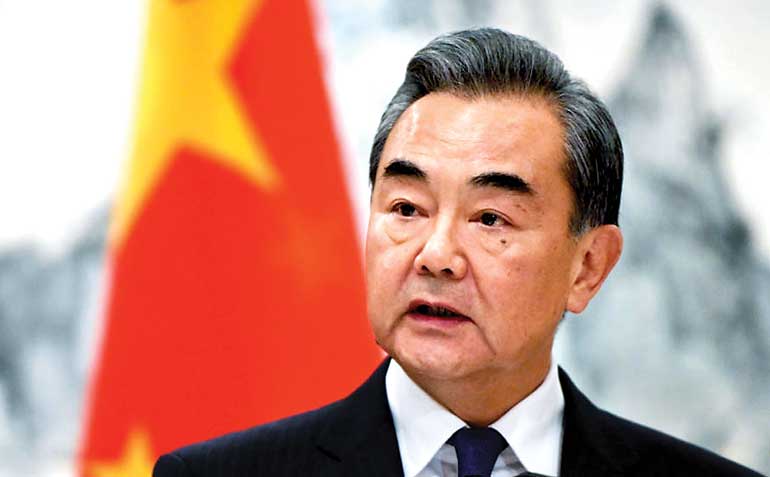Friday Feb 20, 2026
Friday Feb 20, 2026
Tuesday, 28 December 2021 02:43 - - {{hitsCtrl.values.hits}}

Chinese Foreign Minister Wang Yi
newsin.asia: Chinese Foreign Minister Wang Yi’s visit to Sri Lanka, which is to take place around 8 and 9 January, will be happening when the island nation’s economy is in dire straits, facing a severe dollar shortage, absence of foreign investment and a fall in international financial ratings.
Colombo will expect Beijing to help it come out of the woods.
Given the geopolitical importance of Sri Lanka to China, Wang Yi is expected to come up with a number of investment proposals. Sri Lankan Ambassador to China Dr. Palitha Kohona said on Saturday that a number of big-ticket Chinese investments are likely to come to Sri Lanka following Wang’s visit.
Asked if there will be investments in the Chinese-built $ 1.4 billion Colombo Port City (CPC), which is yet to see any investment, Dr. Kohona said that two or major Chinese financial companies have expressed an interest in investing in the CPC. The CPC will be a financial hub and not an industrial hub.
To give confidence to other international investors, Chinese companies will have to invest first. The Financial City, as the CPC is also called, is to come up over land which has been reclaimed from the sea, south of the Colombo harbour. The land is ready, but investments and buildings are yet to come up partly due COVID-19, and partly due to the adverse domestic and international investment climate.
The Chinese are keen on getting the investment part of the CPC kick-started, having reclaimed the land needed from the sea long ago. Earlier in the week, Sri Lankan Foreign Minister Prof. G.L. Peiris had toured the CPC at the invitation of the Chinese authorities.
It was only recently that the Sri Lankan Government had set up a governing structure for the CPC. The structure had to be watered down to accord with Sri Lankan laws and regulations. Even after the structure was established, it was not functioning properly due to bottlenecks.
When the Chinese partner in the project tried to shortcut, a turf war between the chairman of the Port City Commission on the one hand, and the President’s Secretary and the Chinese company on the other, ensued.
Ambassador Kohona hinted that if there is no settlement of the controversy over the selling of the Government’s stakes in the Kerawalapitiya power plant to the US company New Fortress Energy (NFE), Chinese power producers may make a bid for the project.
In September, the Sri Lankan Cabinet approved a share transfer relating to the 300 MW Yugadanavi Power Plant in Kerawalapitya to the NFE. The Sri Lankan Finance Ministry agreed to transfer a 40% stake in the power plant owned by the Treasury (Finance Ministry) to the NFE. Through this transaction, the Treasury would net nearly $ 300 million The NFE would also get the right to supply natural gas to Sri Lanka.
But the agreement was controversial. The nationalist lobby was against it. It was also not presented to Parliament for a debate. Therefore many, including three Cabinet Ministers, filed petitions in the Supreme Court for the cancellation of the deal.
But Sri Lanka badly needs foreign investment to get dollars that are greatly in short supply as a result of the suspension or disruption of economic activity during the year and a half-long COVID-19 pandemic. Sri Lanka’s gross official reserves fell to $ 1.5 billion in November, about one month of imports. Sri Lanka was originally targeting $ 3.5 billion reserves by the year-end.
Sri Lanka has been appealing to all major countries to invest, render financial assistance and give loan waivers. Finance Minister Basil Rajapaksa had recently visited India and India is working out a comprehensive package. But on its part, India expects Sri Lanka to facilitate Indian investments and help implement projects many of which have been in cold storage for years.
However, China’s help is critical mainly because the Chinese have deep pockets and are willing to loosen their purse strings in pursuit of their economic and geopolitical interests in Sri Lanka. On their part, Sri Lankan governments have been receptive to Chinese offers of help because of an absence of opposition from the Sri Lankan nationalist lobby which views investments from some other countries with suspicion.
This has resulted in China’s becoming the top most investor in Sri Lanka. Writing in The Diplomat on May 1, 2021, Sri Lankan economist Umesh Moramudali says that the blooming China-Sri Lanka economic relationship is taking place through three main avenues: debt, investment, and trade. In terms of public debt, over the last decade and a half, China has been the second-largest foreign lender to Sri Lanka. By the end of 2019, China accounted for a little over 10% of Sri Lanka’s outstanding foreign debt stock.
Sri Lanka obtained a Foreign Currency Term Financing Facility (FTFF) of $ 1 billion from the China Development Bank in 2018, and another $ 500 million in March 2020. In early April 2021, Sri Lanka signed an agreement with the CDB to obtain $ 500 million as an FTFF. Sri Lanka may also drawdown on a $ 1.5 billion equivalent Renminbi swap with the People’s Bank of China, Central Bank Governor Nivard Cabraal said on 20 December. This can be used for paying for imports from China.
According to Moramudali, during the decade of 2010-2020, China was the largest foreign investor in Sri Lanka. China continues to be the largest goods exporter to Sri Lanka despite the pandemic. Over the years, China has become the major source from which Sri Lanka obtains raw material for its garments industry, and garments are a major item of export.
(Source: newsin.asia/sri-lanka-has-high-expectations-from-wang-yis-visit/)